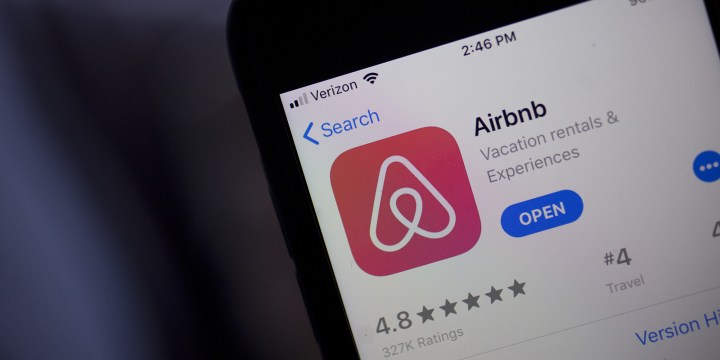HOSPITALITY INDUSTRY
Hell is other people: Airbnb calls for regulation of short-term stays in SA

Short-term rentals should be regulated in South Africa, says the online marketplace that has upturned the hospitality industry by connecting people with short-term stays and faced heavy criticism for driving up rentals in tourist hotspots.
With a worsening cost-of-living crisis, South Africa’s economy shrank by 1.3% in Q4 of 2022. That’s putting greater pressure on consumers who are increasingly forced to cut back on their lifestyle and look at new revenue streams. The sharp increase in the cost of living, experienced at a time of tourism recovery, has meant more people are considering opening up their homes to short-term rentals, which platforms such as Airbnb and LekkeSlaap facilitate.
Airbnb said half of its hosts are opening their homes in SA just to be able to afford the rising cost of living. Based on a survey of 1,800 SA hosts and guests, published on 30 May 2022, its typical host earns just over R26,000 a month by renting out their space.
The vast majority of hosts in SA are regular people – not professionals – with one in five working in either education, healthcare or hospitality. Two-thirds are women and a quarter are over the age of 60.
Airbnb has been the subject of fierce criticism by residents of tourism hotspots around the world – including Cape Town – for enabling an unaffordable increase in home rents, and for a lack of regulation.
In December 2022, there were just over 3,310 Airbnb listings in Cape Town, with 39.1% of entire houses earning up to $1,460 (R26,800) a month, 5.7% managed by professionals, and 30.4% managed independently.
Short-term rental data source Airbtics said a two-bedroom flat in Cape Town can make up to $14,592 a year. Rent in Cape Town is, on average, 53.9% higher than in Johannesburg, but the cost of living is 11.5% cheaper, according to Numbeo.
‘Economic enabler’
Short-term rentals offered by individuals are an economic enabler, which should be viewed as an opportunity to build more inclusive and sustainable tourism, said Airbnb.
The sector, however, lacks a clear national framework for the regulation of short-term rentals and a simple online registration system. Should rules be established to distinguish between professional and non-professional activity, authorities will be able to make decisions on the tourism industry based on reliable data, protect hosts who occasionally share their homes, and clamp down on property speculators who damage communities.
Velma Corcoran, Airbnb’s regional lead for the Middle East and Africa, said their non-professional hosts are essentially micro-entrepreneurs who should be encouraged, while local municipalities need to have sight of businesses that are operating within their orbit.
“A simple online register will work really well in South Africa, allowing anyone who wants to do short-term rentals to register. That information should be shared with the local municipalities so they are able to enforce any regulation.
“What we’re also saying is that there should be a sliding scale of regulation, so for ordinary people who are doing this occasionally in order to make ends meet, [it will not be as strict] as for those who have numerous properties.”
This could create a mechanism for ordinary South Africans to participate in tourism.
Another report for Airbnb, by Genesis Analytics, showed the platform had contributed more than R8-billion to the economy and supported around 22,000 jobs in 2020 – at the height of the pandemic. Contrast that with the almost R11-billion contribution to the gross domestic product which supported more than 28,000 economy-wide jobs in 2019.
In 2021, Airbnb announced a three-year investment drive to South Africa to address barriers to becoming a tourism entrepreneur and to help rebuild a more inclusive and resilient domestic tourism economy.
Lowering barriers to entry
It has also signed a partnership with the Waterberg District Municipality as part of the President’s District Development Model, and just launched a digital campaign focused on the Waterberg – historically a mining community – highlighting how collaboration between the public and private sectors can create more inclusive industries.
This includes the development of programmes that lower barriers to entry into the tourism economy and empower historically disadvantaged tourism entrepreneurs and SMEs to build their businesses.
“The local municipality [asked] how do we transition from mining into tourism?” explained Corcoran.
“So we started to work with them well over a year ago to identify potential properties or accommodation hosts and experience hosts. We identified over 50, and over the course of last year, ran versions of our Airbnb Entrepreneurship Academy, which did skills training, helped hone their accommodation and experiences, ensured they were digitally enabled, and offered mentorship to get them to a place where they can be successful on Airbnb.”
The result is a digital campaign – a partnership with the Endangered Wildlife Trust that shines a spotlight on the Waterberg and the hosts that have come through the academy – to promote travel to the Waterberg.
It’s a small case study in a small area, she said, but it shows what could be possible. BM/DM



















“What we’re also saying is that there should be a sliding scale of regulation, so for ordinary people who are doing this occasionally in order to make ends meet, [it will not be as strict] as for those who have numerous properties.”
Right. Please show me a successful example of “sliding scale” or “not as strict” regulation in South Africa. It’s always heavy handed, and usually quite excessive.
In most cases, the property zoning rez1 already does not permit short term rentals as this constitutes operating a business no different than if one of your neighbors started a barber shop, lawyer office, furniture workshop.
Rules and laws are simply not applied.
Ask anybody with a unit in a holiday complex : airbnb is a nightmare.